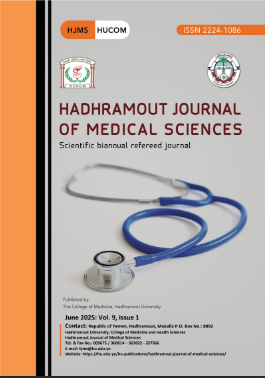3) Barriers to Kangaroo Mother Care Practice: A Questionnaire-Based Study among Healthcare Providers in Special Baby Care Units in Yemen
Keywords:
Preterm birth, Kangaroo Mother Care, BarriersAbstract
Background: Preterm birth (PTB) is a major public health concern and the leading cause of neonatal morbidity and mortality. Simple and feasible interventions can improve neonatal outcomes. Kangaroo Mother Care (KMC), which involves skin-to-skin contact, has been shown to be an effective and practical method to reduce mortality rates among preterm infants in both low- and high-income countries.
Objective: To identify barriers in implementing Kangaroo Mother Care (KMC) among medical and nursing staff in special baby care units.
Methods: A cross-sectional descriptive study was conducted among hospital staff in Mukalla city, Yemen. Data were collected using a self-administered questionnaire that included socio-demographic characteristics, and barriers to implementing Kangaroo Mother Care (KMC). The data were entered into SPSS (version 22). Categorical variables were reported as frequencies and percentage and presented using bar charts.
Results: A total of 176 doctors and nurses participated in the study, with a response rate of 98.9%. The majority (70.7%) were female. Participants over 30 years of age comprised 105 (60.3%) of the sample, and 88.5% had not received any training on Kangaroo Mother Care (KMC). The most commonly reported barriers to KMC implementation were resistance to mindset change, inadequate training, limited experience, and challenges related to the facility environment and available resources.
Conclusion: Healthcare providers are key to successful KMC implementation. Overcoming barriers requires proper training, clear guidelines, staffing optimization, and financial support. In Yemen, integrating KMC necessitates structured education and system-wide adoption strategies.




